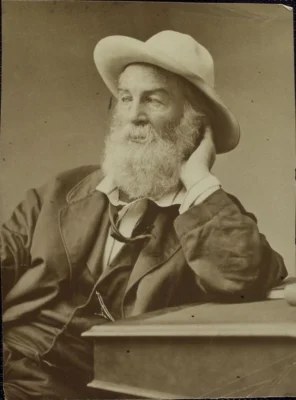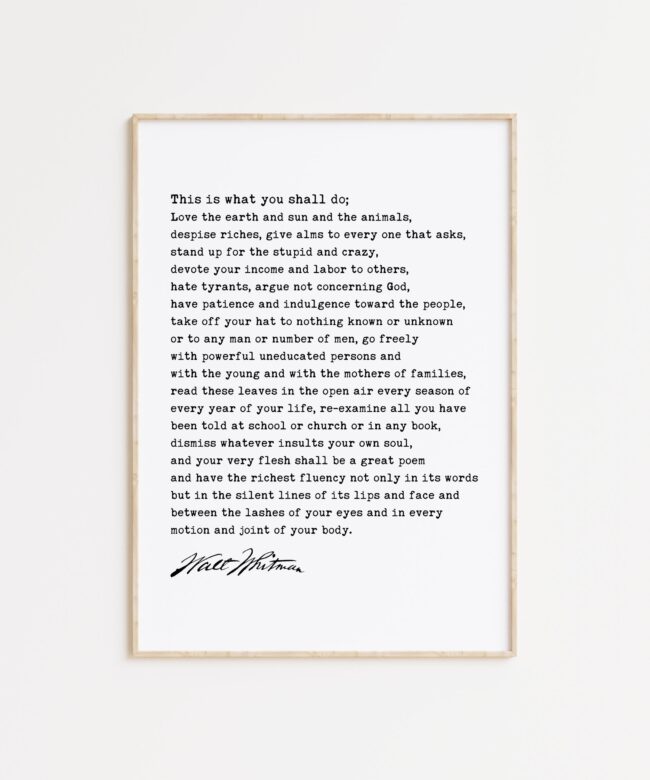Authors
Walt Whitman: The Voice of American Poetry and Inspiration for Timeless Typography Art
Walt Whitman: The Voice of American Poetry and Inspiration for Timeless Typography Art
 Walt Whitman, one of the most influential poets in American history, was born on May 31, 1819, in West Hills, New York. Known for his groundbreaking work Leaves of Grass, Whitman revolutionized American poetry with his free verse style and profound celebration of individualism, nature, democracy, and the human spirit. His work continues to inspire art lovers, poets, and thinkers today—and his timeless words can be found in the very art we create.
Walt Whitman, one of the most influential poets in American history, was born on May 31, 1819, in West Hills, New York. Known for his groundbreaking work Leaves of Grass, Whitman revolutionized American poetry with his free verse style and profound celebration of individualism, nature, democracy, and the human spirit. His work continues to inspire art lovers, poets, and thinkers today—and his timeless words can be found in the very art we create.
Early Life and Influences
Whitman grew up in a working-class family, and his early life was shaped by a range of jobs that exposed him to different facets of American life, including teaching, journalism, and typesetting. This experience, combined with the growing American identity and the challenges of the nation—such as the Civil War—deeply influenced his poetry. He wrote not only with an expansive vision of what America could be but also with a profound sense of compassion for the individual and the collective struggles people face.
Leaves of Grass and Revolutionary Poetry
Published in 1855, Leaves of Grass is Whitman’s masterpiece, a collection of poems that would evolve and expand throughout his lifetime. The work initially shocked critics and readers alike due to its bold themes of sensuality, democracy, and the human experience, but it eventually became recognized as a defining work of American literature.
Whitman’s free verse style—where the traditional structures of rhyme and meter are abandoned—allowed him to explore more deeply personal and universal themes. His poems were filled with the rhythms of everyday speech, making his work accessible and direct while also intensely lyrical. For Whitman, poetry was meant to connect people, reflect life in all its complexity, and celebrate the individual’s unique role in the world.
The Poet of Democracy and Equality
Whitman was more than a poet—he was often called the “bard of democracy.” His works reflect his belief that poetry should serve as a unifying force, transcending social and political divisions. Whitman championed the dignity of all people, and his poems echoed a strong call for equality. Whether celebrating the labor of common workers, the beauty of nature, or the interconnectedness of all life, Whitman’s words resonated with the spirit of the American dream.
Walt Whitman’s Legacy
Whitman passed away in 1892, but his influence endures. His work paved the way for countless poets and writers who followed, breaking new ground in what poetry could be. Today, his poetry not only graces books and libraries but also serves as a powerful source of inspiration for typography art prints, where his most memorable lines take on a new visual life.
From lines like “Keep your face always toward the sunshine – and shadows will fall behind you,” to “Peace is always beautiful,” Whitman’s words evoke a sense of hope, inspiration, and beauty that continues to resonate with modern audiences.
Why Walt Whitman Still Matters Today
In a fast-paced world filled with distractions, Whitman’s poetry reminds us to embrace the present moment and to find beauty in the simple and profound aspects of life. His words challenge us to think deeply, to love fully, and to appreciate the interconnectedness of all things. That’s why many people find Whitman’s work perfect for home and office decor, serving as a daily reminder of the values we cherish: mindfulness, equality, and the pursuit of joy.
At Minimalist Art Shop, we believe that art should inspire. That’s why we feature some of Whitman’s most powerful quotes in our typography art prints, allowing you to bring his timeless wisdom into your everyday space. Whether you’re a poetry lover or simply appreciate the beauty of meaningful words, Whitman’s legacy lives on in each of our designs.
Shop for items featuring Walt Whitman Quotes.
INSPIRATIONAL ART
Free Shipping!
INSPIRATIONAL ART
Free Shipping!
POEMS + QUOTES ART
Free Shipping!
POEMS + QUOTES ART
Will You Come Travel With Me? – Walt Whitman Quote Typography Art Print
Free Shipping!




